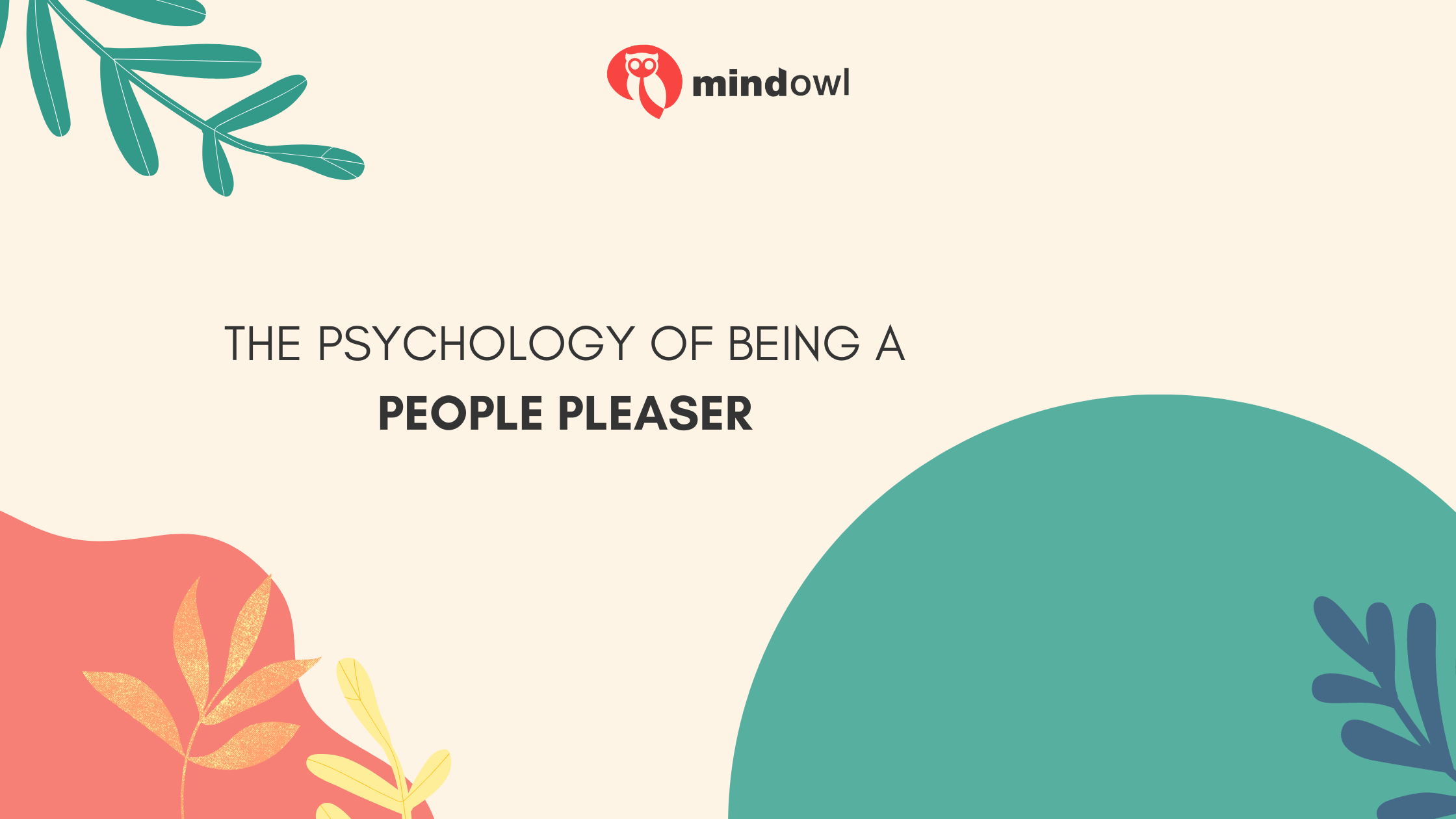Have you ever found yourself saying yes to things you’d rather not do, just to keep others happy? You’re not alone. Many of us struggle with the need to please people around us, even when it costs us our own comfort and happiness.
This urge comes from a mix of emotions and personality traits that push us towards seeking approval and avoiding conflict at any cost.
In this blog post, we’ll dive into what makes someone a ‘people pleaser,’ explore the psychological roots of such behavior, and offer some practical strategies for finding balance.
Key Takeaways
- People pleasers often say yes to things they don’t want to do because they fear rejection and crave approval. This can lead to neglecting their own needs.
- Constantly trying to make others happy can cause stress, anger, and harm relationships due to a lack of genuine interaction and feeling undervalued.
- Setting boundaries and prioritising self-care are key strategies for overcoming the urge to please others at one’s own expense. Saying no is important for mental health and well-being.

Definition and Traits of a People Pleaser
A people pleaser is someone who works hard to make others happy. They often put other people’s needs before their own. This desire comes from fear of rejection or a deep need for affection and approval.
People pleasers are great at reading emotions and can be really helpful, kind-hearted, and agreeable. Yet, they find it tough to decline requests from others, even if it means neglecting their own needs.
These individuals might not realise the toll this behaviour takes on their well-being. They aim to control how others see them by always agreeing and offering help, hoping this will make them liked more.
Sadly, this can lead to feeling drained and unhappy because they spend so much energy on pleasing everyone else.
Psychological Causes of People-Pleasing Behaviour
Many people who always try to make others happy fear being left alone. This fear pushes them to go out of their way, often putting the needs of others before their own. They believe that by making everyone around them happy, they can avoid the pain of abandonment.
This mindset starts a cycle where the person’s worth is tied to how much they can please those around them.
Often, this need to constantly make others content comes from not feeling good about oneself. Some individuals think very little of themselves and doubt their value unless someone else approves of them.
They might ignore what they want or need because they don’t see these desires as important as someone else’s happiness. This lack of self-esteem makes it hard for them to say no, leading them down a path where their main goal is pleasing people, even if it means sacrificing their well-being.
Signs You Might Be a People-Pleaser
You might not know it, but being a people-pleaser can take a toll. If you’re always trying to make others happy, watch out for these signs.
- You say yes when you want to say no. Agreeing to do things you don’t enjoy or have time for is a big sign. You’re putting others’ needs before your own because you want them to like you.
- Feeling upset if someone is unhappy with you is common. People-pleasers worry a lot about what others think of them. If someone isn’t pleased, it feels like a personal failure.
- Your schedule is packed because you can’t turn people down. You might be running from one task to another, trying to help everyone else. This leaves little time for yourself.
- Apologising too much shows up often in people-pleasers’ lives. Saying sorry for things that aren’t your fault or are beyond your control is a way of avoiding conflict.
- Struggling to express your true feelings happens when you’re too focused on keeping the peace. You might hide how you really feel or what you want because it could upset someone else.
- Always seeking approval from others means needing their validation to feel good about yourself. This can lead to doing things just because they’ll make others happy, not because they’re what you want.
- Putting yourself last is a natural outcome of people-pleasing behaviour. Your own needs get ignored while you’re busy catering to everyone else’s.
If these points resonate with you, it might be time to think about how people-pleasing affects your life and consider ways to change this pattern.

The Negative Impact of Being a People Pleaser
Constantly striving to make others happy at the expense of one’s own needs and boundaries can have a profoundly negative impact on various aspects of a people pleaser’s life. From experiencing intense anger, frustration, and resentment towards the very individuals they aim to please, to suffering from heightened anxiety, stress, and potential health issues, the toll of people-pleasing behaviors is significant.
Anger and Frustration
Trying to keep everyone happy can lead to a lot of anger and frustration for people pleasers. This happens because they often put others’ wants before their own needs, feeling like they’ve let someone down if they can’t make them happy. This makes them angry, not just at the situation but also at themselves.
Resentment builds up over time in people who always try to please others. They may start feeling taken advantage of or that their efforts are not appreciated. These feelings grow into deeper anger and frustration, affecting their well-being and relationships with the very people they’re trying to help.
Anxiety and Stress
People pleasers often feel a lot of worry and tension from wanting to make everyone happy, which is hard to do all the time. They fear letting people down, leading to health problems like feeling nervous or having trouble sleeping. Trying too hard to please others takes a toll on one’s wellbeing.
People pleasers put others’ needs before their own, ignoring their feelings and desires. This can leave them feeling drained and stressed out, making it hard for them to enjoy life fully.
Weaker Relationships
Trying hard to make everyone happy often leads to not being true to oneself. This lack of authenticity can harm close bonds with friends and family. People notice when someone is not genuine, and this can lead them to trust that person less. Trust is the foundation of any strong connection.
Aiming to please others at one’s own expense can also lead one into manipulative behaviors. Such actions might seem helpful in the short term but damage connections in the long run. Resentment from always saying yes builds up and eventually hurts these relationships.
Strategies to Overcome People-Pleasing Tendencies
Breaking free from the cycle of people-pleasing behaviours requires a multi-faceted approach that involves establishing healthy boundaries, setting clear personal goals and priorities, and making self-care a non-negotiable aspect of one’s life. By learning to say “no” with confidence and kindness, individuals can begin to manage others’ expectations while respecting their own needs and limitations.
Establishing Boundaries
Learning to say no becomes vital for people pleasers. It marks the first step in setting limits – understanding what you’re okay with and what drains you, then expressing those feelings clearly and kindly to others. This action helps manage their expectations and respects your space.
Setting goals helps too. Decide on personal aims that matter more than pleasing everyone around you. Putting yourself first isn’t selfish; it’s necessary for mental health and happiness. Prioritize tasks that bring joy or progress towards these aims, even if it means saying no to someone else’s request.
Setting Goals and Priorities
To overcome people-pleasing tendencies, it is crucial to set clear and achievable goals. By identifying what truly matters to you and prioritizing those aspects of your life, you can regain control and establish healthy boundaries.
Reevaluating your priorities and practicing the art of saying “no” when necessary are essential steps in breaking free from the cycle of people-pleasing behaviors.
Prioritizing self-care
Prioritizing self-care is essential for breaking free from people-pleasing habits. Acknowledge your own needs and set boundaries to protect your time and energy. Engage in activities that promote relaxation, such as meditation or spending time alone.
Remember the importance of saying “no” when necessary to avoid overextending yourself. Seek support if needed, but be patient with yourself during this process of ensuring you prioritize self-care to replenish emotional reserves.
Conclusion
Understanding the psychology behind being a people pleaser is essential. People-pleasing behaviour can have negative impacts on mental and emotional well-being, leading to stress, resentment, and weakened relationships.
Overcoming these tendencies involves setting boundaries, prioritising self-care, and asserting one’s needs. Recognising and addressing people-pleasing traits is crucial for personal growth and overall well-being.
FAQs
What makes someone a people pleaser?
A people pleaser often puts others’ needs first, constantly seeking to make other people happy. They might neglect their own needs, hoping for validation from others or trying to control how others perceive them.
Is being a people pleaser unhealthy?
Chronic people-pleasing leads to sacrificing your self-worth and emotional well-being, often at the expense of your own happiness. It’s essential to find a balance and not neglect your own needs.
How do I know if I’m a people pleaser?
Signs include struggling to say no, worrying too much about what others think of you, and feeling hurt when you can’t make everyone happy. You might also put everyone else’s wants before your own.
Can wanting to please others ever be good?
The desire to help and make others feel happy is natural—what matters is finding a healthy balance where you don’t lose yourself in the process or sacrifice your well-being for admiration.
Why do I always want to please everyone?
It could stem from early relationships or low self-esteem; many seek approval or fear rejection if they don’t meet every demand. Recognising this urge allows for steps towards healthier social skills and self-compassion.
What should I do if my need to please is taking over my life?
Seeking help from a therapist can provide insights into why you feel compelled to please at your expense—it’s not just about stopping the behaviour but understanding its roots and working towards valuing yourself as much as you value making others happy.
MindOwl Founder – My own struggles in life have led me to this path of understanding the human condition. I graduated with a bachelor’s degree in philosophy before completing a master’s degree in psychology at Regent’s University London. I then completed a postgraduate diploma in philosophical counselling before being trained in ACT (Acceptance and commitment therapy).
I’ve spent the last eight years studying the encounter of meditative practices with modern psychology.

